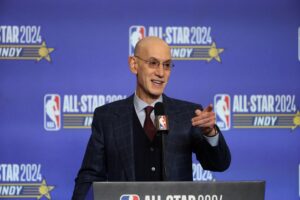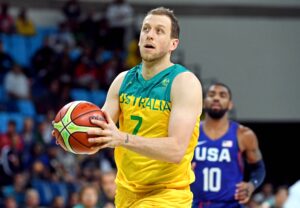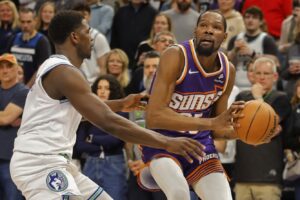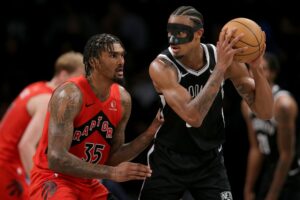While other conferences have deeper and more historic pasts, the relatively new powerhouse college basketball conference, the Big East, has as prestigious a history as any other conference that came before it.
The Big East’s coronation came in 1985 when three conference members advanced to the Final Four. Then two charter members (Georgetown and Villanova) played in the title game. We all know how that went down. From legendary players and coaches to fantastic teams, the Big East has a historic past that can not go unnoticed.
Big East All-Time Series, Part 1
Butler Bulldogs
Best team: 2009-2010
As a member then of the Horizon League, the Bulldogs captured the nation’s heart en route to making it to the National Championship on the heels of a 33-5 record. When squared up against almighty Duke, the upstart Bulldogs gave the Blue Devils all they could handle. Gordon Hayward’s near half-court attempt at the buzzer nearly went in. Still, this team took Butler from a mid-major darling to a big-time player on the national circuit.
Best Player: Gordon Hayward
While other Bulldogs rank higher in the career record books, Hayward is the player who captivated not only the nation but also NBA scouts. In his time with Butler, he was named Horizon League newcomer of the Year in 2009 and a two-time Horizon League first-team member, and also winning Horizon Player of the Year in 2010.
Honorable Mentions: Chad Tucker, Kelan Martin.
Best Coach: Brad Stevens
Butler has had a plethora of fantastic coaches (Chris Holtmann, Todd Lickliter, Thad Matta, Barry Collier, and Tony Hinkle) but no one did a better job of expanding Butler’s brand than Stevens. He amassed a 77.2 winning percentage (166-149) while taking the Bulldogs to the NCAA Tournament in four of the five years with the school. It was under his stewardship that Butler made it to the NCAA Championship twice (in back-to-back years no less), which elevated the school’s profile. That allowed Butler to receive an invitation to the Big East conference.
Creighton Bluejays
Best Team: 1973-74
In the last year under Hall of Fame coach Eddie Sutton, the 1973-74 Creighton team advanced to the regional semifinals and compiled a 23-7 record. Backed by the duo of Gene Harmon and Doug Brookins, this Bluejays squad was the farthest Creighton has ever advanced in the NCAA Tournament.
Best Player: Doug McDermott
Who else but Doug McDermott? He ranks fifth on the all-time NCAA Division I scoring list with 3,150 points. McDermott was the consensus 2014 NCAA Player of the Year and a three-time first-team All-American.
Honorable Mentions: Paul Silas, Bob Gibson, Bob Portman.
Best Coach: Dana Altman
Now doing damage as the coach at Oregon, Altman really made a name for himself at Creighton. He accumulated a 65.0 winning percentage (327-176) while taking the Bluejays to seven NCAA Tournaments and five NIT appearances in his sixteen years at the school. His successor — and current coach Greg McDermott — has the chance to pass him for this honor if he sticks with the school as long as Altman did.
DePaul Blue Demons
Best Team: 1978-79
Although the 1979 Final Four was more known for Larry Bird and Indiana State going up against Magic Johnson and Michigan State in the National Championship, DePaul was ever so close to playing Michigan State in the finals. The Blue Demons posted a 26-6 record that season and took the city of Chicago by heart. Sure, technically we could have given this honor to the 1945 team that won the NIT Championship — which at the time was the premier tournament — on the back of legendary big-man George Mikan. However, the 1978-79 squad catapulted the Blue Demons into national relevance.
Best Player: Mark Aguirre
Aguirre was the star of the 1978-79 Blue Demons even though he was just a freshman. In his three years at DePaul, he averaged 24.5 points and was named the Naismith College Player of the Year (1980) and was also a two-time consensus first-team All-American.
Honorable Mention: George Mikan
Best Coach: Ray Meyer
Viewed as the patriarch of DePaul basketball, the lovable and legendary Ray Meyer made a long-lasting impression in college basketball circles. He ranks 19th in the NCAA in all-time wins (724). He took the Demons to 13 NCAA Tournaments, and many NIT appearances and the aforementioned NIT title in 1945. For 42 years, Meyer was a staple in Chicago sports and you can’t think about DePaul without the image of his gap-toothed smile lighting up a room.
Georgetown Hoyas
Best Team: 1983-84
The Hoyas were a beast in the early-to-mid 1980s. Georgetown made it to three Final Fours in four years (1982, 1984 and 1985). While the 1984-85 team was slightly more dominant, conference mate Villanova upset them in the 1985 championship. However, the year prior, the Hoyas had hardly any blemishes en route to a 35-3 record while winning the title over Hakeem Olajuwon and the Houston Cougars.
Best Player: Patrick Ewing
As the anchor of Georgetown’s dominance in the 1980s, Patrick Ewing is as easy a selection as we have had in this exercise. He was a consensus three-time All-American and the 1985 College Player of the Year. Ewing ranks second in all-time scoring at Georgetown while ranking first in both rebounds and blocks.
Honorable Mention: Eric “Sleepy” Floyd
Best Coach: John Thompson
Thompson is a college basketball coaching legend and is the architect behind Georgetown’s rise to national prominence. His numbers speak for themselves: a 71.4 winning percentage (596-239), three Final Four appearances, and a place in the College Basketball Hall of Fame.
Marquette Golden Eagles
Best Team: 1976-77
Marquette’s one and only championship team have to be the pick here. Although Marquette had some better teams on paper, the 1976-77 team was seemingly a team of destiny. Marquette beat North Carolina to win the championship in legendary coach Al McGuire’s last season. They finished the season with a 25-7 record and let McGuire go out in style.
Best Player: Dwyane Wade
Perhaps he doesn’t have the longevity of other stars or the ultimate hardware (see Butch Lee and Bo Ellis), but Dwyane Wade was a player that had a skillset that perhaps no one before him rivaled. He led the Golden Eagles to the 2003 Final Four in his brief two-year career at Marquette. He was a consensus first-team All-American in 2003 and Conference USA Player of the year. In the 2003 Elite Eight matchup against top-seeded Kentucky, Wade became the fourth player ever to record a triple-double (29 points, 11 rebounds, and 11 assists) in NCAA Tournament history.
Honorable Mention: Markus Howard
Best Coach: Al McGuire
As affable off the court as determined as he was on the court, McGuire was a national treasure. He amassed a 73.9 winning percentage (404-143) while taking Marquette to nine NCAA Tournaments (one aforementioned title) and an NIT Championship (1970). He was named AP Coach of the Year in 1971 and NABC Coach of the Year in 1974. McGuire is also both a member of the National Basketball Hall of Fame and the College Basketball Hall of Fame.
Main Photo
Embed from Getty Images






